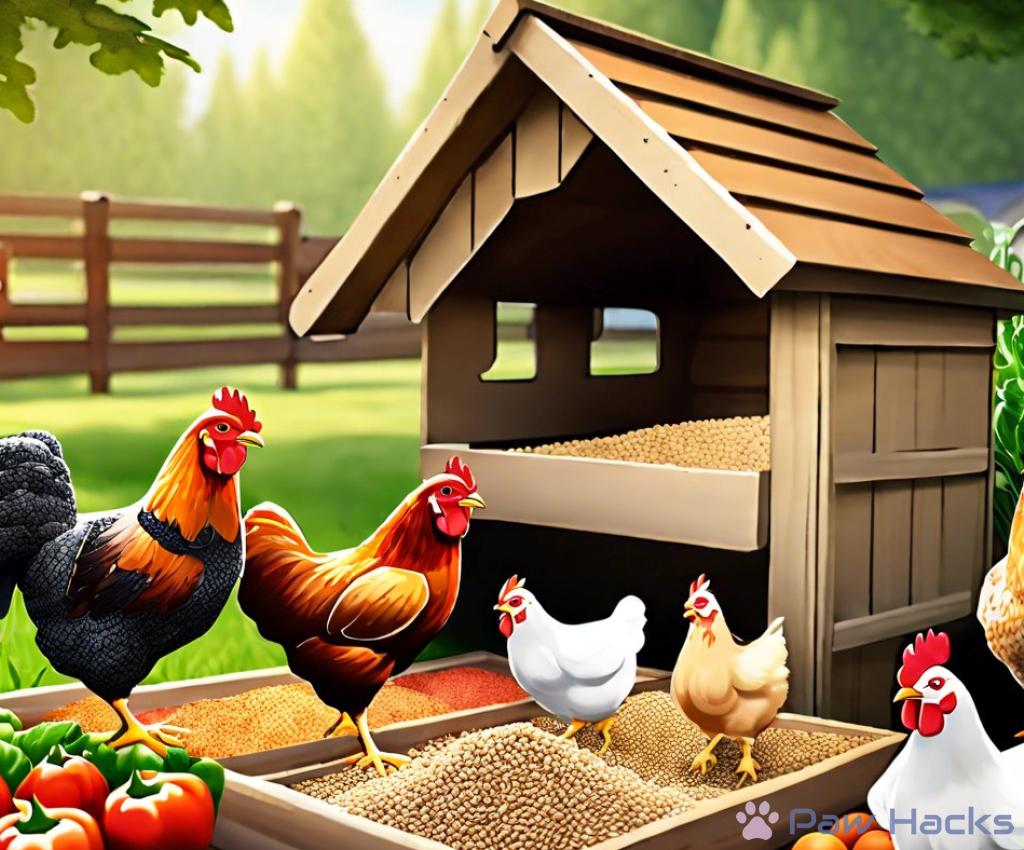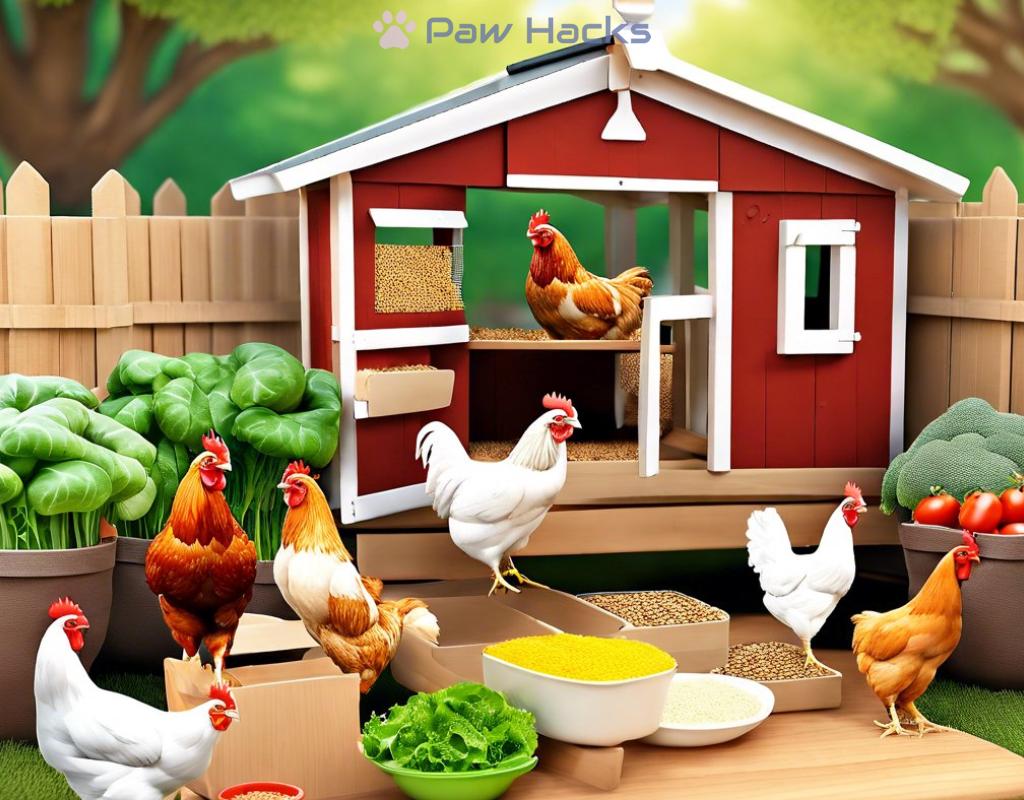Feeding Guidelines for Pet Chickens
Nourishing Your Flock: The Essential Diet for Healthy Chickens

Feeding your chickens a balanced diet is crucial for their health and productivity. Just like any other animal, chickens require a mix of nutrients to grow, lay eggs, and stay healthy. Understanding what constitutes a good diet for chickens can elevate their health and even improve egg production.
Chickens are omnivores, which means they need both plant and animal-based foods to thrive. This article will delve into the essential components of a chicken’s diet, helping you make informed choices for your flock.
To ensure your chickens are healthy and productive, it’s important to include a variety of ingredients in their diet. Each ingredient serves a specific purpose and provides essential nutrients that support their overall well-being.
| Ingredient | Benefits |
|---|---|
| Grains (Corn, Wheat, Barley) | Provide energy and carbohydrates |
| Pelleted Feed | Contains a balanced mix of nutrients |
| Greens (Kale, Spinach) | Rich in vitamins and minerals |
| Protein Sources (Soybean, Mealworms) | Essential for growth and egg production |
In addition to these core ingredients, you can also supplement their diet with kitchen scraps, insects, and even fruits to keep them happy and healthy.
While food is a major component of your chickens’ diet, fresh and clean water is equally important. Chickens need access to water at all times to stay hydrated and support digestion. Without adequate water, they can suffer from decreased egg production and overall health issues.
Additionally, the way you feed your chickens can greatly impact their health. Here are some best practices to ensure your flock gets the most from their diet:
- Provide a clean and spacious feeding area.
- Feed at the same time every day to establish a routine.
- Monitor their feed intake to ensure they are eating enough.
- Avoid overfeeding treats to prevent obesity.
By following these guidelines, you can cultivate a thriving and productive flock.
Understanding Chicken Nutrition: What Every Chicken Owner Should Know
When it comes to raising healthy and happy chickens, understanding their nutritional needs is paramount. Many new chicken owners might find themselves overwhelmed by the plethora of information available. However, grasping the basics of chicken nutrition can significantly enhance your flock’s well-being and productivity. This knowledge not only helps in selecting the right feed but also in recognizing the signs of nutritional deficiencies.
Chickens thrive on a diverse diet that mirrors their omnivorous nature. It’s essential to offer them a combination of grains, proteins, and fresh greens. Each food type plays a unique role in maintaining their health. For instance, grains provide the necessary energy, while proteins are crucial for growth and egg production. Notably, a lack of specific nutrients can lead to health issues, highlighting the importance of a well-rounded diet.
Decoding the Nutritional Needs
Much like humans, chickens require a balanced intake of macronutrients and micronutrients. A proper diet consists of carbohydrates, proteins, fats, vitamins, and minerals. Carbohydrates, mainly sourced from grains, serve as the primary energy source. In contrast, proteins found in sources such as soybean and insects are vital for muscle development and egg production.
In addition to these macronutrients, chickens also need various vitamins and minerals to support their bodily functions. Vitamins such as A, D, and E are critical for vision, bone health, and overall vitality. Furthermore, minerals like calcium and phosphorus are essential for strong eggshells and skeletal structure. Understanding these nutritional components enables chicken owners to tailor their feeding strategies effectively.
The Art of Feeding: Practical Tips for Chicken Owners
Feeding chickens isn’t just about pouring grain into a feeder. It’s about creating a balanced diet that considers their specific needs at different life stages. Young chicks, for example, require a higher protein content to support their rapid growth. As they mature, their dietary needs evolve, necessitating a shift to layers’ feed rich in calcium for egg production.
Moreover, offering a variety of fresh fruits, vegetables, and even kitchen scraps can enrich their diet and keep them engaged. Chickens love pecking at different textures and flavors, which not only promotes mental stimulation but also provides additional nutrients. However, moderation is key; treats should complement their core diet rather than replace it. Remember, a well-fed chicken is a happy chicken, and their health will reflect the quality of their nutrition.
The Power of Variety: How to Create a Balanced Meal Plan for Your Chickens
When it comes to keeping your chickens healthy and happy, variety is not just the spice of life; it’s the cornerstone of their diet. A well-planned meal regimen that incorporates a wide range of food types ensures that your feathered friends receive all the essential nutrients they need. By diversifying their diet, you can optimize their health, enhance egg production, and even boost their immune system. So, how can you effectively create a balanced meal plan that keeps your chickens thriving?
Embracing the Omnivorous Nature of Chickens
Chickens are naturally omnivores, which means they flourish on a diet that includes both plant-based and animal-based foods. This diversity is crucial in providing a comprehensive array of nutrients. Start by including a base of quality pellets or mash that serves as the foundation of their diet. These feeds are designed to meet the basic nutritional requirements of your flock. Next, think about integrating grains, such as corn or oats, as they provide vital energy sources. However, don’t stop there! Introducing protein-rich supplements like mealworms or insects can significantly enhance their diet. Chickens love pecking at these protein sources, and they are essential for supporting growth and egg production.
The Importance of Fresh Produce and Treats
In addition to their primary feed, fresh fruits and vegetables play a vital role in diversifying their diet. Greens such as kale, spinach, and even kitchen scraps like carrot tops or apple cores can offer additional vitamins and minerals. These natural foods not only provide essential nutrients, but they also keep your chickens mentally stimulated. Remember, chickens enjoy a variety of textures and flavors, which can make mealtime an engaging experience. However, moderation is key. Treats should complement their main diet and not exceed more than 10% of their total intake. This balance helps prevent obesity while ensuring that your chickens receive an array of nutrients.
Lastly, always keep an eye on the health and behavior of your chickens. Adjust their diet as needed based on their activity level and the seasons. By monitoring their overall well-being, you can tweak their meal plans to ensure they continue to thrive. A happy and healthy chicken is a reflection of the effort you put into their diet!
Safe Treats and Snacks: Enhancing Your Chickens’ Diet with Healthy Additions
Discovering Delicious and Nutritious Treats
In the quest to keep your chickens happy and healthy, incorporating safe treats and snacks can be a game changer. Not only do these additions enhance your flock’s diet, but they also provide mental stimulation and an exciting mealtime experience. Chickens are naturally curious creatures, and introducing a variety of foods can help fulfill their foraging instincts. However, it’s essential to choose treats that are both safe and beneficial, ensuring that they complement their primary diet without causing any harm.
Choosing the Right Treats for Optimal Health
When selecting treats for your chickens, it’s crucial to focus on nutrient-rich options that promote their overall well-being. Fruits and vegetables serve as excellent additions, providing essential vitamins and minerals. For instance, leafy greens like kale and spinach are packed with nutrients, while fruits such as berries and melons can offer hydration and natural sweetness. However, not all foods are suitable. Certain items like avocado and chocolate are toxic to chickens and should be avoided at all costs. To keep your flock safe, it’s wise to familiarize yourself with both the beneficial and harmful foods.
Creating a Balanced Treat Routine
To maximize the benefits of treats, consider establishing a balanced routine. While it’s tempting to spoil your chickens with goodies, moderation is key. Treats should only make up about 10% of their overall diet. This ensures that they still receive the essential nutrients from their primary feed. One effective method is to offer treats during training sessions or as rewards for good behavior, which can strengthen your bond with them. Additionally, rotating different types of treats can keep your chickens engaged and excited about their meals. By being mindful of what you serve and how much, you can create a delightful and nutritious treat experience for your flock.
Common Feeding Mistakes: What to Avoid for a Thriving Chicken Coop
Avoiding Overreliance on One Type of Feed
One of the most common pitfalls chicken owners fall into is relying too heavily on a single type of feed. While commercial pellets or mash can provide a solid nutritional foundation, they do not encompass the full spectrum of nutrients your chickens need. Feeding them only one type of feed can lead to deficiencies and health issues over time. To promote a balanced diet, it is essential to incorporate a variety of foods, including grains, greens, and protein sources.
Neglecting Fresh and Clean Water
Water is often overlooked when it comes to feeding guidelines, yet it is critical for your chickens’ health. Chickens require constant access to fresh, clean water to aid digestion and maintain hydration. Failing to provide adequate water can result in decreased egg production and various health complications. Make it a routine to check and refill their water supply daily, especially during hot weather.
Too Many Treats, Too Little Nutrition
While it’s tempting to spoil your chickens with treats, especially when they come running at the sight of goodies, moderation is key. Overindulging them with snacks can lead to obesity and nutritional imbalances. To keep their diet well-rounded, treats should make up no more than 10% of their overall daily intake. Instead of constant snacking, consider using treats as rewards during training sessions to encourage positive behavior.
Key Takeaway List of Common Mistakes to Avoid:
- Overreliance on a single feed type.
- Neglecting the importance of fresh water.
- Allowing treats to dominate their diet.
- Ignoring the different nutritional needs at various life stages.
- Failing to monitor and adjust their diet based on health or behavior.
By steering clear of these common feeding mistakes, you can ensure a thriving chicken coop filled with happy and healthy birds. Always keep an eye on their overall well-being and make adjustments as needed to create a balanced and nutritious meal plan.
Share this content:



